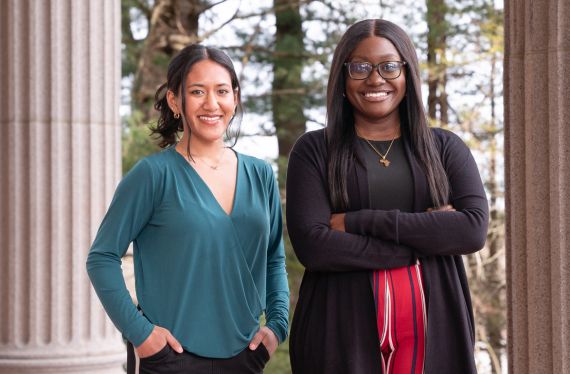In collaboration with the Center for Instructional Innovation, Regis faculty Diana Parry-Cruwys, PhD, BCBA-D®, LABA and Jason Clemence, PhD presented a four-part Lunch and Learn series for faculty and staff on neurodiversity in higher education. Neurodiversity is the concept that neurological differences among people—like autism, ADHD, or dyslexia—should be recognized and respected. The series offered faculty and staff a space for collaborative learning and candid conversations on the topic.
"About one in seven people are considered neurodivergent. It's important to understand that there is no one way that neurodiversity presents itself,” said Prof. Clemence. "Students could very well be struggling despite not displaying what we might think of as signs of neurodivergence. Learning more about the vast nuances of neurodiversity, and striving to understand the different ways that others experience the world, will always strengthen an instructor's pedagogical choices."
The series is part of an on-going effort to provide resources for Regis to embrace and celebrate the neurodiversity of the community. It introduced the concept of neurodiversity and related terms and provided background and guidance on how to best support neurodivergent individuals in campus settings.
Clemence, associate professor of English and Film Studies and current chair of the Department of Humanities, frequently engages with representations of anxiety and compulsion in literature in his work. He has a variety of experiences in engaging with neurodiversity, in both his professional and personal lives.
Parry-Cruwys is assistant professor of Applied Behavior Analysis, co-director of the Regis Autism Center, and a Board Certified Behavior Analyst®. Her area of clinical expertise is working with very young autistic learners. She also has personal experience living with and knowing many neurodivergent people.
You can learn more about each session and view them on YouTube at the links below.
Intro to Neurodiversity (Terms and Definitions)
In the first session, terms and definitions related to neurodiversity were introduced, and perspectives on strengths and challenges of living as a neurodivergent person were reviewed, followed by questions and discussion among Regis faculty and staff. View the full session here.
Ableism in the Educational System/Social vs. Medical Model of Disability
In the second session, Profs. Parry-Cruwys and Clemence delved further into the concept of disability, including how “hidden” disabilities can be under supported in the educational system, and ways in which our thinking as a culture can help or hinder student success. View the full session here.
Universal Design for Learning and Neurodiversity in Higher Education
In the third session, Regis faculty Ericka Hollis, PhD and Diana Perdue, PhD discussed how the principles of Universal Design for Learning (UDL) can support an inclusive learning environment that accommodates the neurodiversity of the campus community. Profs. Parry-Cruwys and Clemence assisted in a facilitated discussion on practical instructional design advice for faculty and staff looking to better support neurodiverse students and colleagues. View the full session here.
Cultivating Inclusive Settings
The final session focused on additional strategies that can be helpful in collegiate settings to assist neurodivergent students in succeeding academically and socially. Building upon what was learned in the Universal Design discussion, this session branched out to consider how to support students who are struggling, including managing classroom dynamics, and fostering self-advocacy skills. View the full session here.


